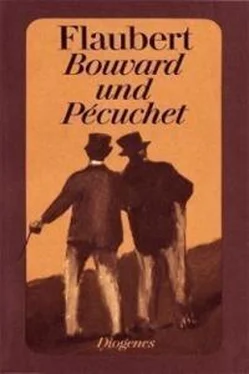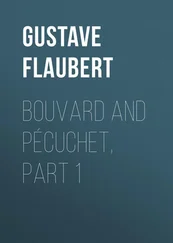The other day when the Aubert and Lorraine families had come from Lisieux and they had expressly borrowed Beljambe's table for the occasion, everything had gone on so well. But this to–day exhibited a certain obstinacy. Why?
The carpet undoubtedly counteracted it, and they changed to the dining–room.
The round table, which was on rollers, glided towards the right–hand side. The operators, without displacing their fingers, followed its movements, and of its own accord it made two turns. They were astounded.
Then M. Alfred articulated in a loud voice:
"Spirit, how do you find my cousin?"
The table, slowly oscillating, struck nine raps. According to a slip of paper, in which the number of raps were translated by letters, this meant "Charming."
A number of voices exclaimed "Bravo!"
Then Marescot, to tease Madame Bordin, called on the spirit to declare her exact age.
The foot of the table came down with five taps.
"What? five years!" cried Girbal.
"The tens don't count," replied Foureau.
The widow smiled, though she was inwardly annoyed.
The replies to the other questions were missing, so complicated was the alphabet.
Much better was the plane table—an expeditious medium of which Mademoiselle Laverrière had made use for the purpose of noting down in an album the direct communications of Louis XII., Clémence Isaure, Franklin, Jean–Jacques Rousseau, and others. These mechanical contrivances are sold in the Rue d'Aumale. M. Alfred promised one of them; then addressing the schoolmistress: "But for a quarter of an hour we should have a little music; don't you think so? A mazurka!"
Two metal chords vibrated. He took his cousin by the waist, disappeared with her, and came back again.
The sweep of her dress, which just brushed the doors as they passed, cooled their faces. She flung back her head; he curved his arms. The gracefulness of the one, the playful air of the other, excited general admiration; and, without waiting for the rout cakes, Pécuchet took himself off, amazed at the evening's exhibition.
In vain did he repeat: "But I have seen it! I have seen it!"
Bouvard denied the facts, but nevertheless consented to make an experiment himself.
For a fortnight they spent every afternoon facing each other, with their hands over a table, then over a hat, over a basket, and over plates. All these remained motionless.
The phenomenon of table–turning is none the less certain. The common herd attribute it to spirits; Faraday to prolonged nervous action; Chevreuil to unconscious efforts; or perhaps, as Segouin admits, there is evolved from the assembly of persons an impulse, a magnetic current.
This hypothesis made Pécuchet reflect. He took into his library the Magnetiser's Guide , by Montacabère, read it over attentively, and initiated Bouvard in the theory: All animated bodies receive and communicate the influence of the stars—a property analogous to the virtue of the loadstone. By directing this force we may cure the sick; there is the principle. Science has developed since Mesmer; but it is always an important thing to pour out the fluid and to make passes, which, in the first place, must have the effect of inducing sleep.
"Well! send me to sleep," said Bouvard.
"Impossible!" replied Pécuchet: "in order to be subject to the magnetic action, and to transmit it, faith is indispensable."
Then, gazing at Bouvard: "Ah! what a pity!"
"How?"
"Yes, if you wished, with a little practice, there would not be a magnetiser anywhere like you."
For he possessed everything that was needed: easiness of access, a robust constitution, and a solid mind.
The discovery just made of such a faculty in himself was flattering to Bouvard. He took a plunge into Montacabère's book on the sly.
Then, as Germaine used to feel buzzings in her ears that deafened her, he said to her one evening in a careless tone:
"Suppose we try magnetism?"
She did not make any objection to it. He sat down in front of her, took her two thumbs in his hands, and looked fixedly at her, as if he had not done anything else all his life.
The old dame, with her feet on a footwarmer, began by bending her neck; her eyes closed, and quite gently she began to snore. At the end of an hour, during which they had been staring at her, Pécuchet said in a low tone:
"What do you feel?"
She awoke.
Later, no doubt, would come lucidity.
This success emboldened them, and, resuming with self–confidence, the practice of medicine, they nursed Chamberlan, the beadle, for pains in his ribs; Migraine the mason, who had a nervous affection of the stomach; Mère Varin, whose encephaloid under the collar–bone required, in order to nourish her, plasters of meat; a gouty patient, Père Lemoine, who used to crawl by the side of taverns; a consumptive; a person afflicted with hemiplegia, and many others. They also treated corns and chilblains.
After an investigation into the disease, they cast questioning glances at each other to determine what passes to use, whether the currents should be large or small, ascending or descending, longitudinal, transversal, bidigital, tridigital, or even quindigital.
When the one had had too much of it, the other replaced him. Then, when they had come back to their own house, they noted down their observation in their diary of treatment.
Their suave manners captivated everyone. However, Bouvard was liked better, and his reputation spread as far as Falaise, where he had cured La Barbée, the daughter of Père Barbée, a retired captain of long standing.
She had felt something like a nail in the back of her head, spoke in a hoarse voice, often remained several days without eating, and then would devour plaster or coal. Her nervous crises, beginning with sobs, ended in floods of tears; and every kind of remedy, from diet–drinks to moxas, had been employed, so that, through sheer weariness, she accepted Bouvard's offer to cure her.
When he had dismissed the servant–maid and bolted the door, he began rubbing her abdomen, while leaning over the seat of the ovaries. A sense of relief manifested itself by sighs and yawns. He placed his finger between her eyebrows and the top of her nose: all at once she became inert. If one lifted her arms, they fell down again. Her head remained in whatever attitude he wished, and her lids, half closed, vibrating with a spasmodic movement, allowed her eyeballs to be seen rolling slowly about; they riveted themselves on the corners convulsively.
Bouvard asked her if she were in pain. She replied that she was not. Then he inquired what she felt now. She indicated the inside of her body.
"What do you see there?"
"A worm."
"What is necessary in order to kill it?"
She wrinkled her brow. "I am looking for—I am not able! I am not able!"
At the second sitting she prescribed for herself nettle–broth; at the third, catnip. The crises became mitigated, then disappeared. It was truly a miracle. The nasal addigitation did not succeed with the others, and, in order to bring on somnambulism, they projected the construction of a mesmeric tub. Pécuchet already had even collected the filings and cleaned a score of bottles, when a scruple made him hesitate.
Amongst the patients there would be persons of the other sex.
"And what are we to do if this should give rise to an outburst of erotic mania?"
This would not have proved any impediment to Bouvard; but for fear of impostures and attempts to extort hush–money, it was better to put aside the project. They contented themselves with a collection of musical glasses, which they carried about with them to the different houses, so as to delight the children.
One day, when Migraine was worse, they had recourse to the musical glasses. The crystalline sounds exasperated him; but Deleuze enjoins that one should not be frightened by complaints; and so they went on with the music.
Читать дальше








![Гюстав Флобер - Закат Карфагена [Сборник]](/books/414440/gyustav-flober-zakat-karfagena-sbornik-thumb.webp)


